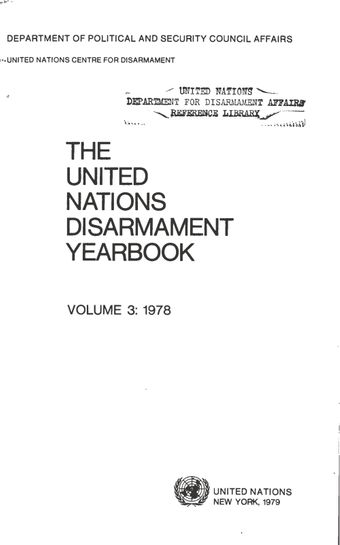Declaration of the Indian Ocean as a zone of peace

- Author: United Nations Office for Disarmament Affairs
- Main Title: United Nations Disarmament Yearbook 1978 , pp 383-399
- Publication Date: December 1978
- DOI: https://doi.org/10.18356/0d6658d8-en
- Language: English
After receiving considerable attention in various forums for a number of years, the question of establishing a zone of peace in the Indian Ocean was placed on the agenda of the General Assembly for the first time at the twenty-sixth session in 1971, under an item entitled “Declaration of the Indian Ocean as a zone of peace”, at the request of Sri Lanka, later joined by the United Republic of Tanzania. At that session, the General Assembly adopted resolution 2832 (XXVI) in which it solemnly declared that the Indian Ocean, within limits to be determined, together with the air space above and the ocean floor subjacent thereto, was designated for all time as a zone of peace. The Assembly also called upon the great Powers, in conformity with the Declaration, to enter into consultations with the littoral States of the Indian Ocean with a view to halting the further expansion of their military presence in the Indian Ocean and eliminating from the area all bases, military installations and logistical supply facilities, nuclear weapons and weapons of mass destruction and any manifestation of great Power military presence conceived in the context of great Power rivalry. Further, the Assembly called upon the littoral and hinterland States of the Indian Ocean, the permanent members of the Security Council and other major maritime users of the Indian Ocean, in pursuit of the objective of establishing a system of universal collective security without military alliances and strengthening international security through regional and other co-operation, to enter into consultations with a view to the implementation of the Declaration and such action as might be necessary to ensure that: (a) warships and military aircraft might not use the Indian Ocean for any threat or use of force against the sovereignty, territorial integrity and independence of any littoral and hinterland State of the Indian Ocean in contravention of the purposes and principles of the Charter of the United Nations; (b) subject to the foregoing and to the norms and principles of international law, the right to free and unimpeded use of the zone by the vessels of all nations was unaffected; and (c) appropriate arrangements were made to give effect to any international agreement that might ultimately be reached for the maintenance of the Indian Ocean as a zone of peace.
© United Nations
ISBN (PDF):
9789210579827
Book DOI:
https://doi.org/10.18356/97a66feb-en
Related Subject(s):
Disarmament
Sustainable Development Goals:
Countries:
India
-
From This Site
/content/books/9789210579827s006-c002dcterms_title,dcterms_subject,pub_keyword-contentType:Journal -contentType:Contributor -contentType:Concept -contentType:Institution105
/content/books/9789210579827s006-c002
dcterms_title,dcterms_subject,pub_keyword
-contentType:Journal -contentType:Contributor -contentType:Concept -contentType:Institution
10
5

